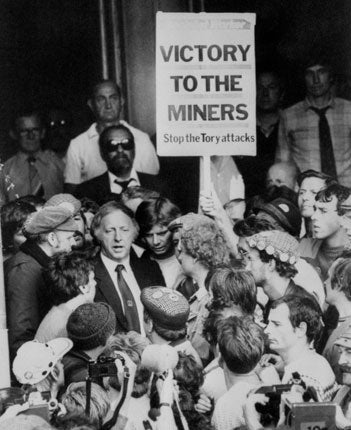Public-sector strike ban attracts support in survey

Your support helps us to tell the story
From reproductive rights to climate change to Big Tech, The Independent is on the ground when the story is developing. Whether it's investigating the financials of Elon Musk's pro-Trump PAC or producing our latest documentary, 'The A Word', which shines a light on the American women fighting for reproductive rights, we know how important it is to parse out the facts from the messaging.
At such a critical moment in US history, we need reporters on the ground. Your donation allows us to keep sending journalists to speak to both sides of the story.
The Independent is trusted by Americans across the entire political spectrum. And unlike many other quality news outlets, we choose not to lock Americans out of our reporting and analysis with paywalls. We believe quality journalism should be available to everyone, paid for by those who can afford it.
Your support makes all the difference.People support calls for a change in the law to ban strikes by public-sector workers if there is a low turnout in strike ballots, according to a survey for i. They also believe that trade unions will fail to win public sympathy if they carry out their threat to stage co-ordinated strikes in their battle over pensions.
Unions vowed last night to press ahead with a strike by up to 750,000 public employees on Thursday, after talks with ministers ended without a last-minute breakthrough.
The survey by ComRes found that, by a margin of 50 per cent to 32 per cent, people agreed that the Government should ban public-sector strikes unless there has been a turnout of at least 50 per cent in the ballot to approve the action.
The finding will increase the pressure on ministers to bring in a legal minimum turnout – an idea favoured by the London Mayor, Boris Johnson, the Confederation of British Industry and some Tory ministers and backbenchers. But Vince Cable, the Liberal Democrat Business Secretary responsible for strike laws, is more cautious, believing such a move could inflame the current dispute.
By 55 to 26 per cent, people believe the unions will not enjoy public sympathy if they call the co-ordinated strikes threatened for this autumn if the current conflict is not resolved.
However, the poll also found some support for the unions' position in their battle with the Government over proposed reforms to public sector pensions. By 49 to 35 per cent, people agree that the workers have a legitimate reason to strike over the issue, and believe, by 46 to 35 per cent, that the Government would be wrong to change the pension schemes if most workers affected opposed them.
Join our commenting forum
Join thought-provoking conversations, follow other Independent readers and see their replies
Comments